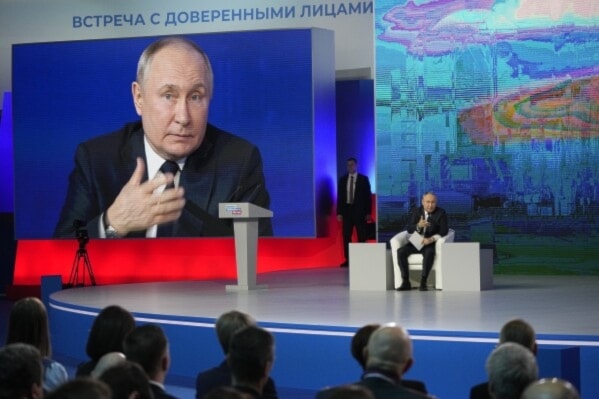EU states to decide whether to recognize Russia election results: Spox
Russia's Presidential elections are scheduled this week from March 15-17 between Vladimir Putin, Nikolai Kharitonov, Leonid Slutsky, and Vladislav Davankov.
-

Russian President Vladimir Putin attends a meeting with his election campaign activists in Moscow Russia, on January 31, 2024. (AP)
Peter Stano, the chief spokesperson for the European Union's external affairs, said Thursday that each member of the EU will decide whether to recognize Russia's impending presidential election, adding that the group would first have to observe the entire process.
Stano explained during a briefing that "Decision about recognition or non-recognition of elections is for the member states to consider after we see the whole process."
The spokesperson also stated that the European Commission will not comment on the election until it takes place and that Brussels will not accept the results in Russia's accessioned regions of Donetsk, Luhansk, Kherson, and Zaporizhzhia.
Russia's presidential elections are due to be held on 15–17 March 2024. The country's incumbent president Vladimir Putin is planning to run for another six-year term.
Competing along with Putin are Leonid Slutsky, who chairs the international affairs committee in the lower house of the Russian parliament, as well as Nikolai Kharitonov, chair of the house's Far East and Arctic development committee, and Vladislav Davankov, the house's deputy speaker.
Syria is sending a parliamentary delegation to Russia to observe the presidential election scheduled for March 15-17, a source in the Syrian parliament told Sputnik on Tuesday.
The invitation for this delegation came from the Russian legislature.
"Basem Sudan, chairman of the Syrian-Russian Friendship Committee, will lead the Syrian delegation," the source said.
This year's election promises to be one of the toughest for Russian residents in the EU, as some countries intend to implement strict measures on voters.
The chief of police in Latvia announced on Monday that the Baltic nation will conduct background checks on Russian citizens submitting their votes in the presidential election at the embassy in Riga. The purpose is to ensure they possess valid residency permits, and if necessary, deport them.
Latvian authorities also announced they would monitor individuals queuing to vote for any signs of "endorsing the war in Ukraine", which could, due to the vague nature of the statement, even include voicing or displaying support for Russian President Vladimir Putin.
US assigns new mission to NGOs: Reducing Russian elections turnout
Joe Biden's administration has entrusted US NGOs with the mission of diminishing the turnout in the Russian presidential elections, the Russian Foreign Intelligence Service (SVR) revealed this week.
"According to information received by the Russian Foreign Intelligence Service, the administration of Joe Biden sets the task for US NGOs to achieve a decrease in the turnout in the upcoming March 15-17 presidential elections in the Russian Federation," the message read.
The SVR stated that the Russian opposition's Internet resources distributed messages to Russian citizens to neglect the presidential election as per Washington's wish.
"With the participation of leading US IT specialists, it is planned to carry out cyberattacks on the remote electronic voting system, which will make it impossible to count the votes of a significant proportion of Russian voters," the statement added.
It explained that according to Washington's calculations, the "reduction in turnout" acquired through appeals and cyberattacks will grant the West an excuse to doubt the results of the elections in Russia.

 3 Min Read
3 Min Read








